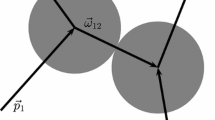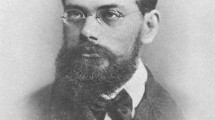Abstract
The physicist not only observes phenomena, but he also has an active role in the formulation of some laws. For instance, laws involving irreversibility refer explicitly to what can or cannot be done by physicists. As the abilities of the latter may vary, we obtain sequences of laws, the convergence of which is discussed.
Similar content being viewed by others
References
A. Einstein, inA. Einstein, Philosopher-Scientist, P. A. Schilpp, ed. (Library of Living Philosophers, Evanston, Illinois, 1949), p. 85.
J. S. Bell,Physics 1, 195 (1964).
H. P. Stapp,Nuovo Cim. 40B, 191 (1977).
A. Peres,Am. J. Phys. 46, 745 (1978).
Author information
Authors and Affiliations
Rights and permissions
About this article
Cite this article
Peres, A. The physicist's role in physical laws. Found Phys 10, 631–634 (1980). https://doi.org/10.1007/BF00715043
Received:
Issue Date:
DOI: https://doi.org/10.1007/BF00715043




